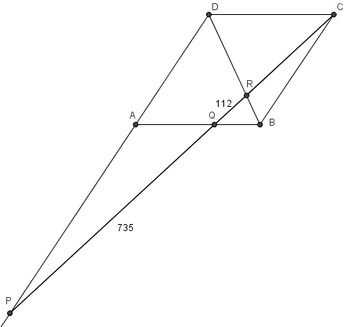Difference between revisions of "1998 AIME Problems/Problem 6"
m (→Solution: downsize slightly) |
(→Solution) |
||
| Line 3: | Line 3: | ||
== Solution == | == Solution == | ||
| + | === Solution 1 === | ||
[[Image:AIME_1998-6.png|350px]] | [[Image:AIME_1998-6.png|350px]] | ||
| − | There are several [[similar triangles]]. <math>\triangle PAQ | + | There are several [[similar triangles]]. <math>\triangle PAQ\sim \triangle PDC</math>, so we can write the [[proportion]]: |
<div style="text-align:center;"> | <div style="text-align:center;"> | ||
| Line 11: | Line 12: | ||
</div> | </div> | ||
| − | Also, <math>\triangle BRQ | + | Also, <math>\triangle BRQ\sim DRC</math>, so: |
<div style="text-align:center;"> | <div style="text-align:center;"> | ||
| − | <math> | + | <math>\frac{QR}{RC} = \frac{QB}{CD} = \frac{112}{RC} = \frac{CD - AQ}{CD} = 1 - \frac{AQ}{CD}</math><br /> |
<math>\frac{AQ}{CD} = 1 - \frac{112}{RC} = \frac{RC - 112}{RC}</math> | <math>\frac{AQ}{CD} = 1 - \frac{112}{RC} = \frac{RC - 112}{RC}</math> | ||
| Line 24: | Line 25: | ||
<math>\frac{AQ}{CD} = \frac{735}{847 + RC} = \frac{RC - 112}{RC}</math><br /> | <math>\frac{AQ}{CD} = \frac{735}{847 + RC} = \frac{RC - 112}{RC}</math><br /> | ||
| − | <math> | + | <math>735RC = (RC + 847)(RC - 112)</math><br /> |
<math>0 = RC^2 - 112\cdot847</math> | <math>0 = RC^2 - 112\cdot847</math> | ||
</div> | </div> | ||
| − | Thus, <math> RC = \sqrt{112*847} = 308 \ | + | Thus, <math> RC = \sqrt{112*847} = 308</math>. |
| + | |||
| + | === Solution 2 === | ||
| + | |||
| + | We have <math>\triangle BRQ\sim \triangle DRC</math> so <math>\frac{112}{RC} = \frac{BR}{DR}</math>. We also have <math>\triangle BRC \sim \triangle DRP</math> so <math>\frac{ RC}{847} = \frac {BR}{DR}</math>. Equating the two results gives <math>\frac{112}{RC} = \frac{ RC}{847}</math> and so <math>RC^2=112*847</math> which solves to <math>RC=\boxed{308}</math> | ||
== See also == | == See also == | ||
Revision as of 14:37, 11 August 2012
Contents
[hide]Problem
Let ![]() be a parallelogram. Extend
be a parallelogram. Extend ![]() through
through ![]() to a point
to a point ![]() and let
and let ![]() meet
meet ![]() at
at ![]() and
and ![]() at
at ![]() Given that
Given that ![]() and
and ![]() find
find ![]()
Solution
Solution 1
There are several similar triangles. ![]() , so we can write the proportion:
, so we can write the proportion:
![]()
Also, ![]() , so:
, so:
![]()
![]()
Substituting,
![]()
![]()
![]()
Thus, ![]() .
.
Solution 2
We have ![]() so
so ![]() . We also have
. We also have ![]() so
so ![]() . Equating the two results gives
. Equating the two results gives ![]() and so
and so ![]() which solves to
which solves to ![]()
See also
| 1998 AIME (Problems • Answer Key • Resources) | ||
| Preceded by Problem 5 |
Followed by Problem 7 | |
| 1 • 2 • 3 • 4 • 5 • 6 • 7 • 8 • 9 • 10 • 11 • 12 • 13 • 14 • 15 | ||
| All AIME Problems and Solutions | ||










